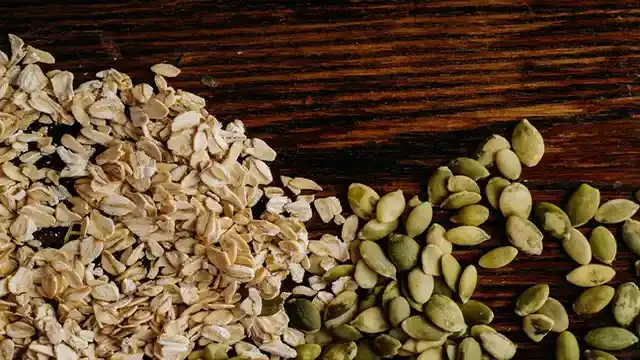This is accompanied by a lot of foods that contain a lot of nutrients. Improve digestive health. Next time you're looking for ways to improve the situation, consider adding these 7 amazing health benefits of oats to your list!. 7 Amazing Health Benefits of Oats You Didn't Know About.
 |
| Oats |
1) Weight loss
There's one amazing health benefit of oats you may not have known about—they can help with weight loss. Studies show that people who eat foods high in soluble fiber, like oats, tend to weigh less than those who don't. Soluble fiber is found in plant foods and it's best known for helping us feel full (and more satisfied). It also helps regulate digestion and promotes healthy cholesterol levels. Add some oats to your diet if you're looking for ways to cut calories—it'll help fill you up while keeping hunger at bay!
2) Anti-inflammatory properties
The gluten-free oats you eat every morning are good for your body on multiple levels. In fact, just a 1⁄2 cup (1 serving) contains only 161 calories, 4 grams of fat, and 3 grams of protein, as well as 3.8 grams of fiber. However, it’s also rich in vitamins and minerals such as calcium (60 percent DV), manganese (25 percent DV), magnesium (30 percent DV), and potassium (5 percent DV). Oats are also high in antioxidants, including phytonutrients called avenanthramides. Studies have shown that these compounds may help reduce LDL cholesterol in your bloodstream while increasing HDL cholesterol—the good kind that protects your heart health—in other words, they support a healthy cardiovascular system!
3) Diabetics can control their blood sugar with oatmeal
Oatmeal is high in fiber, which helps keep blood sugar levels balanced. If you have Type 2 diabetes, research shows that eating oats can help lower your LDL (bad) cholesterol and help raise HDL (good) cholesterol. A study by Harvard School of Public Health's Frank Hu found that diets with whole grains—including oatmeal—were associated with a 12% drop in heart disease risk compared to diets low in whole grains. And if you're trying to lose weight or get fit, oatmeal can be an important part of your diet: It has been shown to lower triglycerides, total cholesterol, and LDL while raising HDL (the good) cholesterol.
4) Prevents heart attacks
Studies have shown that people who eat a daily serving of oats are up to 40% less likely to suffer from heart disease. They also help lower LDL cholesterol (AKA bad cholesterol) and triglycerides, as well as increase HDL cholesterol (AKA good cholesterol). This helps prevent cardiovascular disease and heart attacks, which is a huge benefit considering heart disease is one of America's top killers. The same effect can be seen when using oat milk in smoothies and cooking, so even if you don't like drinking your breakfast you can still reap these benefits!
5) They help in controlling cholesterol levels
According to a study, diets that include oats lowered bad LDL cholesterol by 13 percent and boosted good HDL cholesterol by 9 percent compared with diets that didn’t contain oats. Since high LDL levels are associated with increased heart disease risk, and high HDL levels indicate a reduced risk for developing heart disease, eating oats can help to control your heart health. The benefits are even greater when you pair them with whole grains: Diets containing whole grains resulted in a 16 percent reduction in LDL levels and a 12 percent rise in HDL levels compared to low-fiber diets. In another study published in 2012, researchers discovered that adding whole-grain foods such as oatmeal significantly reduced bad cholesterol along with reducing inflammation—another major cause of cardiovascular disease.
6) Treats cancerous cells from spreading to other parts of the body
Whole grains have been shown to increase HDL and LDL in our blood. When our HDL is up, we are at a lower risk for heart disease, when our LDL is down it reduces cardiovascular risks. Adding oats to your diet can improve your health as well as many other benefits from heart health to fighting cancerous cells from spreading. Due to their high fiber content and their ability to reduce cholesterol levels, adding oats can lower cardiovascular diseases. Research shows that eating three daily servings (one serving = 1/2 cup) of whole grains can help protect against colorectal cancer by reducing the amount of time that carcinogens stay in contact with tissues. Eating oatmeal will lead you toward a longer life free from illness and illnesses such as cancer or any cancers.
7) Improves memory
The nutritional benefits of oats especially cut oats, are many. Steel-cut oats contain both soluble and insoluble fiber. The first help lower levels of bad cholesterol (such as LDL) in the blood while increasing levels of good cholesterol (such as HDL). Insoluble fiber provides a range of health benefits including reducing constipation and promoting regularity. Both types help lower blood pressure by making you feel full more quickly, which helps you eat less overall. In addition to reducing the risk of heart disease and type 2 diabetes, soluble fiber can help lower cholesterol as well as improve digestive health by preventing diarrhea or constipation from irritable bowel syndrome or diverticulitis.


Comments
Post a Comment